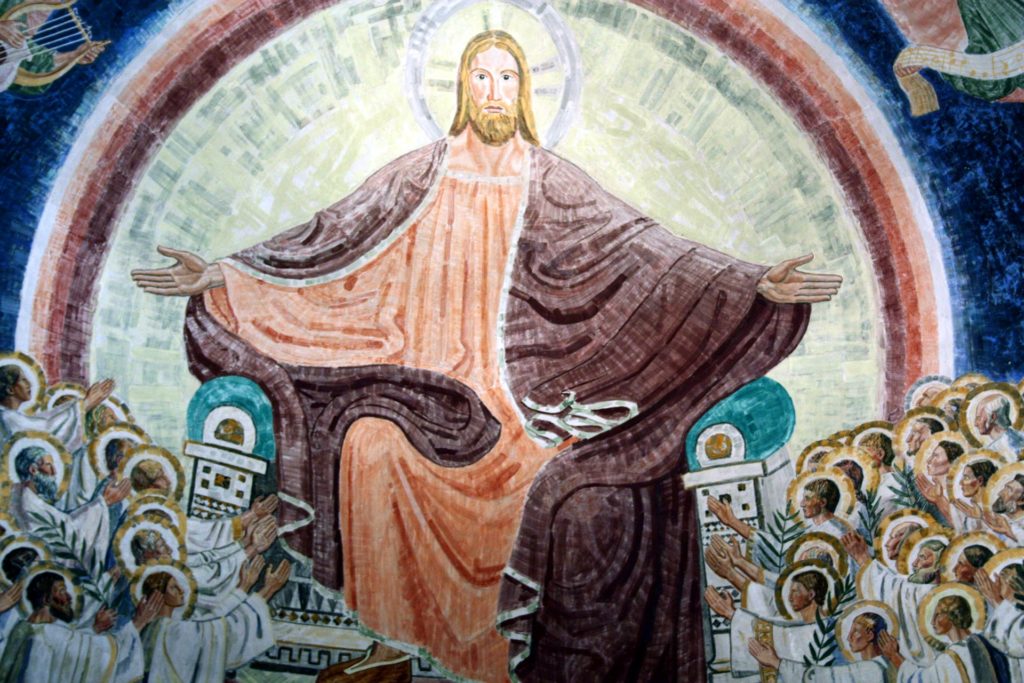Podcast: Play in new window | Download
Subscribe: Spotify | Email | RSS

Big news! I can announce today that I have received a new letter from the Lord Jesus. An angel who said his name was “Boloni” appeared to me and showed me where the golden plates were buried. (I am not at liberty to disclose this location.)
I thought this was a most unusual method of delivery, especially as the soil was fresh; the plates had just been buried. You see, this is no ancient composition written in Greek or Aramaic or Reformed Egyptian. Evidently, in the intervening period, the Lord Jesus has learned English. And it’s clear that he has continued to be attentive to our theological situation.
Naturally, I was only allowed to borrow the golden plates long enough to transcribe them; the angel waited while I did this, then carted them off into the sky in a flaming armored car.
As I read and re-read this epistle I realized that the Lord was continually referring to or quoting the New Testament, so I added a number of footnotes, mostly for scriptural citations. I was quite surprised to see that Jesus always quotes the NRSV. Sorry, ESV and NIV – evidently this is the new Authorized Version.
In any case, it seems to me that this letter contains an important message for our day. Jesus forcefully addresses some widespread confusions about who he is, calling Christians back to an apostolic christology.
You can download and print my transcription here.

Links for this episode:
- Shirk: Associating Others with Allah
- The Definition of Chalcedon
- Is Jesus a Human Person?
- The Nicene Creed
- Clarifying Catholic Christologies
- God and his Son: the logic of the New Testament
- Metaphysics and Logic of the Trinity
- podcast 124 – a challenge to “Jesus is God” apologists
- podcast 227 – Who Should Christians Worship?
- podcast 214 – Has Bauckham clarified his “divine identity” theory? – Part 2
- podcast 213 – Has Bauckham clarified his “divine identity” theory? – Part 1
- podcast 226 – Biblical Words for God and for his Son Part 3 – post-biblical uses of biblical words, and new words
- podcast 225 – Biblical Words for God and for his Son Part 2 – Old “Lord” vs. New “Lord”
- podcast 224 – Biblical Words for God and for his Son Part 1 – God and “God” in the Bible
- podcast 70 – The one God and his Son according to John
- podcast 85 – Heretic! Four Approaches to Dropping H-Bombs

- Texts quoted or referred to in this episode: Acts 3:22, 7:37; Deuteronomy 8:15; John 1:17-18; Exodus 3:15; John 10:33-36; John 8:40; Numbers 23:19; John 17:1-3; 1 Corinthians 8:6; Ephesians 4:6; 1 Timothy 2:5; 1 John 5:20; John 4:25-26; 1 Corinthians 15:3-4, 42-56; 1 Timothy 1:17, 6:16; 2 Timothy 1:10; Romans 1:23; John 1:29; Matthew 3:17, 17:5; Hebrews 2:14-18, 1 Timothy 2:5-6; Romans 5:8; Mark 15:32, 39; Mark 14:36; Philippians 2:8-9; Mark 14:62; Ephesians 1:20; Revelation 7:17; Daniel 7:14; John 20:17; Matthew 27:37, 39; James 1:13; Luke 4:1-13; Hebrews 4:15; Luke 5:16, 11:41; Luke 2:41-42, 47; Matthew 6:5-13; Mark 9:37; Luke 4:18; John 5:36, 14:10-11; Acts 2:22; Acts 2:43, 4:30, 5:12, 6:8; John 10:22-39; John 10:30; 1 Corinthians 3:8; Revelation 3:12; 1 Corinthians 8:4-6; Mark 12:29; John 14:8-11; Colossians 1:15; John 14:10; Hebrews 8:1; John 20:28; 2 Corinthians 5:19; 1 Corinthians 8:6; Ephesians 4:4-6; 1 John 1:3; John 4:25-26; John 14:24-25; Philippians 2:6-11; Revelation 5:9-10; Matthew 9:2-8; John 20:23; Mark 13:32; John 14:26; John 5:19-20; Psalm 89:6, Isaiah 40:18; Deuteronomy 10:17; Romans 11:33-35; Matthew 26:59-66, 27:17,22, 29, 37, 42-44; Mark 14:55-65, 15:2-5, 12, 18, 26, 32; Luke 22:66-71, 23:1-5; John 18:33-38; Romans 1:4; Hebrews 1:8; Luke 2:11; Jude 1:4; Revelation 2:8; Revelation 22:13; John 20:17; Romans 15:6; 2 Corinthians 1:3; Ephesians 1:3,17; 1 Peter 1:3; Revelation 1:6, 3:2, 12; Revelation 15:3-4; John 17:1-3; 1 John 5:19-20; Genesis 32:22-32; Genesis 18:1-22; Exodus 24:9-11; Romans 8:3; 1 Timothy 3:16; 1 John 4:2; Philippians 2:7; Luke 1:35; Matthew 1:18; Romans 1:3; Acts 2:22; John 8:40; 1 Corinthians 15:47; John 3:13; Luke 1:32; Romans 1:3; 2 Timothy 2:8; Revelation 22:16; Hebrews 1:1-2; Colossians 1:13-20; 2 Corinthians 5:17-18; Mark 10:6, 13:19; Romans 1:20; Acts 4:24, 14:15, 17:24-31; Hebrews 11:3; Ephesians 3:9?; 1 Timothy 4:3-4; Revelation 4:11, 10:6, 14:7; Isaiah 44:24b; Genesis 1:3, 6, 9, 11, 14, 20, 24, 26; Psalm 33:6; John 1:1-3; Luke 1:31; Psalm 33:6; Proverbs 8:22-31; Matthew 11:19, 13:53; 1 Corinthians 1:24; Colossians 2:2-3; Hebrews 1:2; John 4:22; Genesis 41:37-45; Acts 17:31; 1 Corinthians 15:27; 1 Corinthians 15:42-46; Philippians 2:11; Revelation 6:16, 7:14; John 8:40; Hebrews 2:17, 3:1, 4:14-15, 6:20, 8:1, 9:11; 1 Timothy 2:5; Revelation 1:17-18; 1 Corinthians 15:20-28, 11:3; Mark 12:35-37; Mark 12:36; Psalm 110:1; Acts 2:36; John 13:20; 1 John 4:15; John 18:20; John 15:15; Mark 1:3; Matthew 1:23; Hebrews 1:10-12; Matthew 14:33; Matthew 26:64; Mark 14:62; John 11:25-27; Matthew 16: 15-17; Mark 8:29; Luke 9:20; John 20:31; John 6:68; John 8:28, 12:49, 14:10; Acts 2:22; Romans 12:5; 1 Corinthians 12:27.

Dale, excellent work! I so want my trinitarian friends to listen to/read this epistle! The references in the text format are appreciated as well! Thanks for all you do!
Thanks, Dr. Tuggy. As a brand new monotheist, having left trinitarianism, your points in this talk are now so clear and obvious. I can clearly see now that trinitarian theory is a late, and entirely made up superstucture imposed upon the simple and plain teaching of the Bible concerning God the Father and his human Son. I have been a practical unitarian for twenty-five years, thanks to my training and studies in a discipline called Biblical Theology, which emphasises an historical, narrative, reading of the Bible, as opposed to neo-Platonistic transcendentalism. During that time I held on to the deity of Christ as a theological truth, but an outlier, because of the way I understood John 1 and Philippians 2, but I could not see any reason why it was necessary for our salvation, despite the Westminster Confession’s weak explanation. I thought, and said, that we must believe everything that the scriptures teach, including Christ’s deity, with the proviso that we should give it the low emphasis that it is given in the inspired writings. It is now obvious to me that it is not even an outlier. It is entirely absent.
Thanks for your comment, Roger. Yeah, the whole modern-era push of trying to read the scriptures without anachronism really requires moving away from Trinity theories and two-natures theories. The proof-texts fall away one after the other, and then also we see the clash between catholic theories and actual NT theology and christology. It is interesting, the convoluted excuses we come up with to stay with the status quo – e.g. “traditions change and evolve” – as if that helps! But I guess the social pressures to stay in the camp and as strong as steel, and also, one’s job and livelihood may depend on expressing such loyalty, at least outwardly. At some point we have to decide if we take the scriptures seriously enough to try to get at what they actually mean, and not be content with “theological” interpretation, by which it seems to me that many mean: eisegesis.
Many good points summarised here.
However, just on that “Lord” business:
Seigneur is 700 years old in French Bible translation, Lord is 600 years old in English, HERNN is super old in German. How old is it in your language and how inapt is it today to represent first century usage?
Comments are closed.